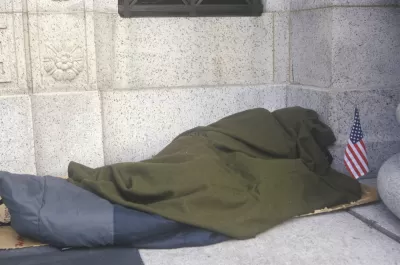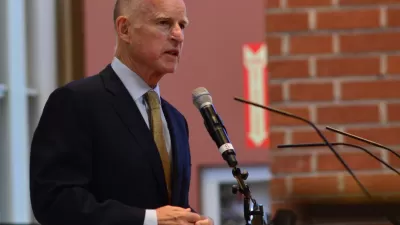The revenue bonds would be funded from a millionaires' surtax, approved by voters in 2004, to pay for health programs, but not housing, for the mentally ill. Also on ballot: a $4 billion general obligation bond measure to fund housing for veterans.

"Gov. Jerry Brown (D) authorized the ballot measure Wednesday when he signed the state’s annual budget and related legislation," reports Liam Dillon for the Los Angeles Times on June 27.
The measure would draw funding from dollars generated by Proposition 63, a 1% income tax surcharge on millionaires passed in 2004 that funds mental health services. Housing built or rehabilitated under the plan would be designated for mentally ill residents living on the streets.
The measure is aptly named the "Use Millionaire's Tax Revenue for Homelessness Prevention Housing Bonds Measure," a legislatively-referred state statute authorized by the passage of Assembly Bill 1827.
The legislature had attempted to authorize the use of $2 billion from Prop. 63 two years ago, reported Gale Holland for The Times on Jan. 4, 2016.
The new units would operate on a "housing first" model, taking in homeless people with mental illness and drug and alcohol problems even if they refuse psychiatric or substance abuse treatment, officials said.
The “No Place Like Home” initiative, Assembly Bill 1618 by Sen. Kevin De Léon (D-L.A.), passed the legislature (posted here) and was signed into law by Gov. Brown on July 1, 2016, but funding was never authorized. "[A] Sacramento attorney and mental health advocates challenged the effort in court, arguing that the money shouldn’t be diverted from treatment programs and that legislators needed a vote of the people to authorize the funds," adds Dillon.
Using the Prop. 63 revenue stream for housing may mean less funding for county programs serving the mentally ill. "Some of the $400 million in Proposition 63 money [Los Angeles County] received [in 2016] goes to housing, but it also funds a range of mental health services, including crisis intervention and transition programs for people coming out of locked psychiatric facilities," wrote Holland.
"That case is still in litigation and the November ballot measure, if successful, would free up the money," adds Dillon.
$4 billion for veterans' housing
Unlike the homelessness housing bond measure, a revenue bond measure, the California Housing Loans, Grants, and Programs and Veterans' Loans Bond, a legislatively referred bond act, has no revenue stream of its own, so it is a general obligation bond measure. The measure stems from Senate Bill 3 by Sen. Jim Beall (D-San Jose), one of a broad package of housing bills that were signed into law last year by Gov. Brown to address the state's chronic housing crisis.
FULL STORY: Californians face November decision on $2-billion spending plan for homeless housing

Study: Maui’s Plan to Convert Vacation Rentals to Long-Term Housing Could Cause Nearly $1 Billion Economic Loss
The plan would reduce visitor accommodation by 25,% resulting in 1,900 jobs lost.

Alabama: Trump Terminates Settlements for Black Communities Harmed By Raw Sewage
Trump deemed the landmark civil rights agreement “illegal DEI and environmental justice policy.”

Why Should We Subsidize Public Transportation?
Many public transit agencies face financial stress due to rising costs, declining fare revenue, and declining subsidies. Transit advocates must provide a strong business case for increasing public transit funding.

Paris Bike Boom Leads to Steep Drop in Air Pollution
The French city’s air quality has improved dramatically in the past 20 years, coinciding with a growth in cycling.

Why Housing Costs More to Build in California Than in Texas
Hard costs like labor and materials combined with ‘soft’ costs such as permitting make building in the San Francisco Bay Area almost three times as costly as in Texas cities.

San Diego County Sees a Rise in Urban Coyotes
San Diego County experiences a rise in urban coyotes, as sightings become prevalent throughout its urban neighbourhoods and surrounding areas.
Urban Design for Planners 1: Software Tools
This six-course series explores essential urban design concepts using open source software and equips planners with the tools they need to participate fully in the urban design process.
Planning for Universal Design
Learn the tools for implementing Universal Design in planning regulations.
Smith Gee Studio
Alamo Area Metropolitan Planning Organization
City of Santa Clarita
Institute for Housing and Urban Development Studies (IHS)
City of Grandview
Harvard GSD Executive Education
Toledo-Lucas County Plan Commissions
Salt Lake City
NYU Wagner Graduate School of Public Service





























